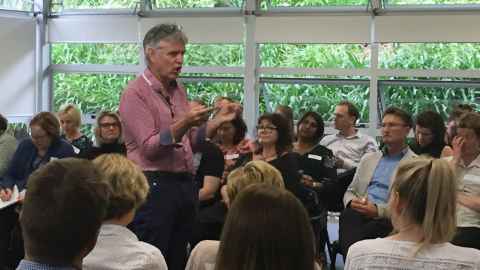John Hattie: Too much discussion in the wrong places
6 November 2018
Professor John Hattie returned to his old stomping ground on Monday night to challenge educators’ thinking around what really works in education.

Educators talk a lot about creating the right structure for learning, from public vs charter schools to class sizes and testing frequency, but what if these debates are just distractions from what really impacts learning?
The University of Auckland’s Kohia Centre welcomed Visiting professor John Hattie last week, who challenged about 100 educators from around the country with questions like that.
Once a Professor of Education with the University of Auckland, Professor Hattie is currently the Director of the Melbourne Education Research Institute. His work, which is reflected in his latest book, Visible Learning Feedback, has involved bringing together data from hundreds of meta-analyses covering hundreds of millions of students, and represents the largest ever evidence-based research into what actually works in schools to improve student learning.
Much of the discussion around raising academic outcomes is actually a trap, Hattie told the crowd. While most activities we undertake to improve student outcomes have a positive impact, most of the discussion is about structural matters that actually have minimal impact on raising student learning.
There’s not much we do to kids that harms them: 95% to 98% of the
things we do in the name of enhancing achievement, do affect
achievement.
“Here’s the good news,” John said. “There’s not much we do to kids that harms them: 95% to 98% of the things we do in the name of enhancing achievement, do affect achievement. All you need to enhance achievement is a pulse. So, when politicians and parents get up and say they know how to improve achievement, they’re right! Because most teachers can.”
His research ranked factors that improve or harm student learning, and he found that while structural factors have a relatively small effect, one factor that had a big effect everywhere in the world is teacher expertise. A big part of teacher expertise as a means of raising student outcomes, centres on the use of effective feedback, both in terms of teachers working together as evaluators of their impact, understanding and reflecting on their errors and developing a culture of trust in the classroom so students have more opportunities to learn.
Professor Hattie discussed how to use feedback effectively, both for staff and for students, describing feedback as a powerful yet often variable tool, with roughly 30% of feedback actually having a negative effect.
“Feedback is arguably the most critical and powerful aspect of teaching and learning. Yet, there remains a paradox: why is feedback so powerful and why is it so variable?”
Kohia Centre professional learning manager Colleen Bott says Professor Hattie’s work has had a polarising effect on the education sector. During the evening he took the opportunity to discuss opposition and challenges around his work.
“His research suggesting that class size may have little bearing on student achievement was inevitably one issue that arose on the night,” Colleen said. “When addressing the issue, he remained focused on the importance of feedback and noted that even with reduced class sizes the amount of quality feedback provided to students did not improve. What needs to improve is the relationships we have with our students and the quality of the feedback that we provide.”
Published in partnership with Education Central.